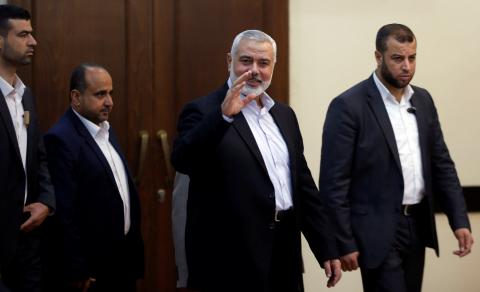Advertisement
Palestinian forum convened after 22 years, beset by boycotts and divisions
RAMALLAH, WEST BANK (Reuters) - A powerful but rarely convened assembly that calls itself the Palestinian "supreme authority" meets for the first time in 22 years on Monday, but boycotts and rifts suggest it will struggle to achieve its stated goal of unity against Israel and the United States.
President Mahmoud Abbas is expected to use the four-day Palestinian National Council (PNC) meeting to renew his legitimacy and to install loyalists in powerful positions to begin shaping his legacy.
Abbas has billed the meeting of the Palestinian National Council (PNC), the de facto parliament of the Palestinian Liberation Organization, as a chance to establish a united front against Israel and the United States, after President Donald Trump's recognition of Jerusalem as Israel's capital.
Nabil Abu Rdainah, a spokesman for Abbas, said it was "a strong message to the whole world that the Palestinian people are committed to their right to establish their independent state."
But the location, timing and attendance have been criticized from outside the PLO, and from within.
Islamist groups are boycotting, and question the PLO's claim to be the "sole legitimate representative" of the Palestinian people.
They include Islamic Jihad and Hamas, which defeated Abbas's western-backed Fatah in parliamentary elections in 2006 and has been locked in rivalry with it since.
They say that by holding the meeting in the Israeli-occupied West Bank, Abbas is excluding Palestinians who risk being arrested or turned back by Israel if they try to attend.
Three PLO factions said they would boycott the 700-member assembly, including the Popular Front for the Liberation of Palestine. It sought a postponement to give more time for reconciliation efforts between Fatah and Hamas, to overcome divisions and ensure broader participation.
Mahdi Abdul-Hadi, a Jerusalem-based analyst, said Abbas seemed intent on driving through his own agenda and replacing enemies with loyalists on the PLO's powerful Executive Committee, whose members are appointed by the PNC.
"When people look at these names they understand it is a one-man show. It is Abbas's agenda," said Abdul-Hadi.
Pointing out that Abbas's mandate as president expired in 2010, he said the Palestinian leader appeared to be returning to old institutions to fend off criticism.
"He needs to re-inject legitimacy and the recognition of his authority," said Abdul-Hadi.
"COLLECTIVE YAWN"
At a curtain-raiser event in a luxury hotel on Sunday Mohamed Sobeih, the Secretary-General of the PNC, said it would be a "strategic" meeting.
On its website the PNC says it "represents the supreme authority of the Palestinian people in all their places of residence."
But its aging leadership - Abbas is 83 and PNC chairman Saleem Al-Zanoon is 85 - has many younger Palestinians questioning its relevance, especially those who can barely remember its last full meeting in 1996.
"This PNC will not deliver me or my generation; it won’t deliver the diaspora or Gaza. The PNC is not delivering an entire generation that views these meetings with a collective yawn," said Diana Buttu, a Canadian-born former legal adviser to Palestinian peace negotiators, who now lives in Haifa.
"Abbas may think that this will grant him 'legitimacy' but the question remains - legitimacy from whom?"
In Ramallah, Ahmed Tibi, an Arab lawmaker in Israel's parliament, conceded that the PLO needed to improve, but said it remained the "main corpus to solve the issues of the Palestinians."
But outside Ramallah there was widespread scepticism.
In Gaza many circulated a message on their phones that poked fun at the ages of PNC members. "Applicants should be 90 years of age and above," it said. Cynicism was also rife in the West Bank. "We need fresh blood in Palestinian political life," said Firas Doudein, in Hebron.
(Reporting by Stephen Farrell, Ali Sawafta and Nidal al-Mughrabi, Editing by William Maclean)



















Add new comment